2014年全国高考英语试题及答案-(新课标1)
2014年高考英语全国1卷听力(录音+原文+答案)

2014年高考英语全国1卷听力(录音+原文+答案)听力下载链接:https:///s/15fBZw6-1yj309FrPWC-lBg提取码:12342014全国卷听力试题第一部分听力(共两节,满分30分)做题时,先将答案标在试卷上。
录音内容结束后,你将有两分钟的时间将试卷上的答案转涂到答题卡上。
第一节(共5小题;每小题1.5分,满分7.5分)听下面5段对话。
每段对话后有一个小题,从题中所给的A、B、C三个选项中选出最佳选项。
听完每段对话后,你都有10秒钟的时间来回答有关小题和阅读下一小题。
每段对话仅读一遍。
例:How much is the shirt?A. £19.15.B. £9.18.C. £9.15.答案是C。
1. What does the woman want to do?A. Find a place.B. Buy a map.C. Get an address.2. What will the man do for the woman?A. Repair her car.B. Give her a ride.C. Pick up her aunt.3. Who might Mr. Peterson be?A. A new professor.B. A department head.C. A company director.4. What does the man think of the book?A. Quite difficult.B. Very interesting.C. Too simple.5. What are the speakers talking about?A. Weather.B. Clothes.C. News.第二节(共15小题,每小题1.5分,满分22.5分)听下面5段对话或独白。
每段对话或独白后有几个小题,从题中所给的A、B、C三个选项中选出最佳选项。
2014年全国各省市高考英语作文题目及范文
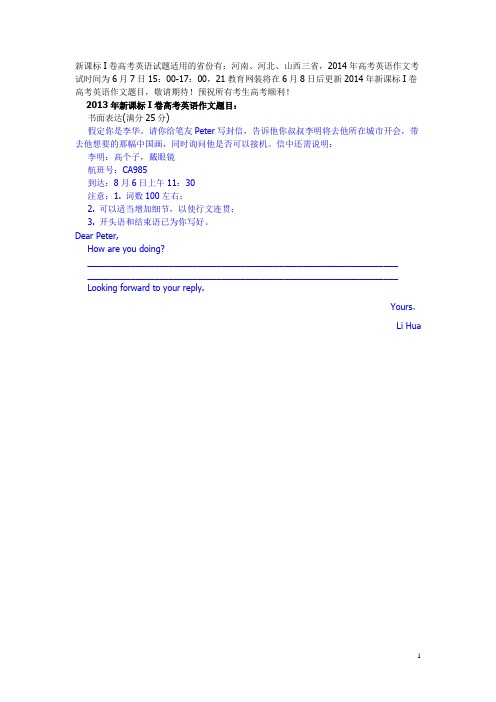
新课标I卷高考英语试题适用的省份有:河南、河北、山西三省,2014年高考英语作文考试时间为6月7日15:00-17:00,21教育网装将在6月8日后更新2014年新课标I卷高考英语作文题目,敬请期待!预祝所有考生高考顺利!2013年新课标I卷高考英语作文题目:书面表达(满分25分)假定你是李华。
请你给笔友Peter写封信,告诉他你叔叔李明将去他所在城市开会,带去他想要的那幅中国画,同时询问他是否可以接机。
信中还需说明:李明:高个子,戴眼镜航班号:CA985到达:8月6日上午11:30注意:1. 词数100左右;2. 可以适当增加细节,以使行文连贯;3. 开头语和结束语已为你写好。
Dear Peter,How are you doing?_________________________________________________________________ _________________________________________________________________ Looking forward to your reply.Yours,Li Hua2014年北京高考于6月7日,8日举行,2014高考英语作文题目会在(2014年6月7日)在21教育网发布,请广大考生引起重视!21教育网助您在6月7日杨帆起航之时,第一时间了解自己的战况。
恭祝各位考生旗开得胜!敬请关注:21教育网21教育网会稍后发布2014北京高考各科目试题汇总和2014北京高考各科目的答案汇总。
请各位考生收藏本页面关注(Ctrl+D)试题推荐:2013年高考真题——英语(北京卷)word解析版2014年北京高考作文题目:第四部分:书面表达(共两节,15 分)第一节情景作文(20 分)假设你是红星中学高三(1)班的学生李华,请按照以下四幅图的先后顺序,用英文写一篇周记。
记述爸爸出差期间,妈妈生病,你照顾她的过程。
(完整版)2014年高考英语全国卷1
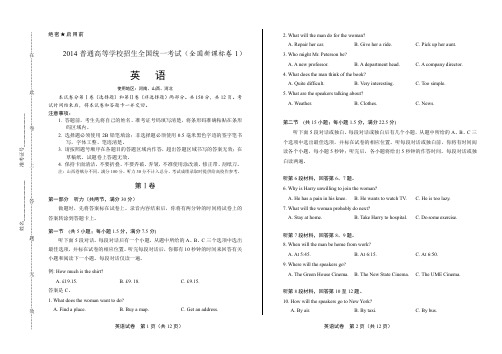
绝密★启用前2014普通高等学校招生全国统一考试(全国新课标卷1)英语使用地区:河南、山西、河北本试卷分第Ⅰ卷(选择题)和第Ⅱ卷(非选择题)两部分。
共150分,共12页。
考试时间结束后,将本试卷和答题卡一并交回。
注意事项:1. 答题前,考生先将自己的姓名、准考证号码填写清楚,将条形码准确粘贴在条形码区域内。
2. 选择题必须使用2B 铅笔填涂;非选择题必须使用0.5毫米黑色字迹的签字笔书写,字体工整、笔迹清楚。
3. 请按照题号顺序在各题目的答题区域内作答,超出答题区域书写的答案无效;在草稿纸、试题卷上答题无效。
4. 保持卡面清洁,不要折叠、不要弄破、弄皱,不准使用涂改液、修正带、刮纸刀。
注:山西卷赋分不同,满分180分。
听力30分不计入总分,考试成绩录取时提供给高校作参考。
第Ⅰ卷第一部分 听力(共两节,满分30分)做题时,先将答案标在试卷上。
录音内容结束后,你将有两分钟的时间将试卷上的答案转涂到答题卡上。
第一节 (共5小题;每小题1.5分,满分7.5分)听下面5段对话。
每段对话后有一个小题,从题中所给的A 、B 、C 三个选项中选出最佳选项,并标在试卷的相应位置。
听完每段对话后,你都有10秒钟的时间来回答有关小题和阅读下一小题。
每段对话仅读一遍。
例: How much is the shirt? A. £19.15.B. £9. 18.C. £9.15.答案是C 。
1. What does the woman want to do? A. Find a place.B. Buy a map.C. Get an address.2. What will the man do for the woman? A. Repair her car.B. Give her a ride.C. Pick up her aunt.3. Who might Mr. Peterson be? A. A new professor.B. A department head.C. A company director.4. What does the man think of the book? A. Quite difficult.B. Very interesting.C. Too simple.5. What are the speakers talking about? A. Weather.B. Clothes.C. News.第二节 (共15小题;每小题1.5分,满分22.5分)听下面5段对话或独白。
2014年高考英语江苏卷(含详细答案)
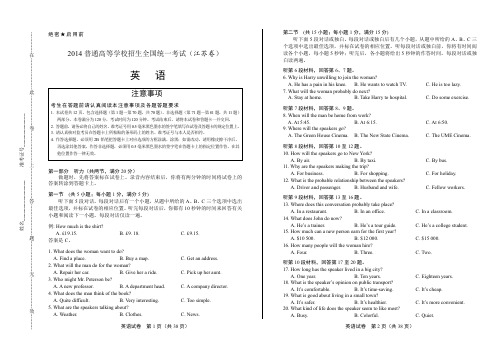
英语试卷 第1页(共38页)英语试卷 第2页(共38页)绝密★启用前2014普通高等学校招生全国统一考试(江苏卷)英语第一部分 听力(共两节,满分20分)做题时,先将答案标在试卷上。
录音内容结束后,你将有两分钟的时间将试卷上的答案转涂到答题卡上。
第一节 (共5小题;每小题1分,满分5分)听下面5段对话。
每段对话后有一个小题,从题中所给的A 、B 、C 三个选项中选出最佳选项,并标在试卷的相应位置。
听完每段对话后,你都有10秒钟的时间来回答有关小题和阅读下一小题。
每段对话仅读一遍。
例: How much is the shirt? A. £19.15. B. £9. 18.C. £9.15.答案是C 。
1. What does the woman want to do? A. Find a place. B. Buy a map. C. Get an address.2. What will the man do for the woman? A. Repair her car. B. Give her a ride. C. Pick up her aunt.3. Who might Mr. Peterson be? A. A new professor. B. A department head. C. A company director.4. What does the man think of the book? A. Quite difficult. B. Very interesting. C. Too simple.5. What are the speakers talking about? A. Weather. B. Clothes.C. News.第二节 (共15小题;每小题1分,满分15分)听下面5段对话或独白。
每段对话或独白后有几个小题,从题中所给的A 、B 、C 三个选项中选出最佳选项,并标在试卷的相应位置。
2014年高考英语全国卷1-答案

2014年普通高等学校招生全国统一考试(全国新课标卷1)英语答案解析第Ⅰ卷第一部分听力第一节1.【答案】A【解析】由对话中女士说“This is the address. How do I find it?”可知女士想找个地方,故选A2.【答案】B【解析】由对话中男士说“I can drop you off on my way.”可知,男士将送女士一程,故选B.3.【答案】C【解析】由对话中男士说今天早上已经叫了各部门负责人到他办公室,他们需要向Mr. Peterson汇报工作。
由此可知,Mr. Peterson 是公司负责人,故选C.4.【答案】B【解析】由对话中男士说“…once I started I simply couldn’t put it down”可知男士认为书很有趣,故选B 5.【答案】A【解析】由对话中女士说都已经五月份了,还得穿御寒的衣服,男士说收音机广播了好消息,说不定从明天起女士就可以穿短裤了呢。
由此可知,谈话者在谈论天气,故选A.6.【答案】B【解析】由男士说“You know there is a basketball match on TV today. Let’s just stay home and watch it.”可知男士想要看电视,所以拒绝加入女士,故选B.7.【答案】C【解析】女士邀请男士一起打乒乓球,男士不想参加,女士最后说她和海伦一起打。
由此可知,女士接下来会做运动,故选C.8.【答案】A【解析】由“I should be home from work at 5:45.”,故选A.9.【答案】C【解析】女士说也许UME电影院七点的电影更好,Jacky Chan 主演的,男士说可以。
由此可知,谈话者要去UME电影院,故选C.10.【答案】A【解析】由“So we're leaving on Monday from Hartsfield International Airport…”可知答案.故选C.11.【答案】A【解析】对话中女士说公司安排了车送他们到机场,并且公司负责这次旅行的费用。
2014年全国高考英语试题分类汇编:改错题【Word版,含解析】
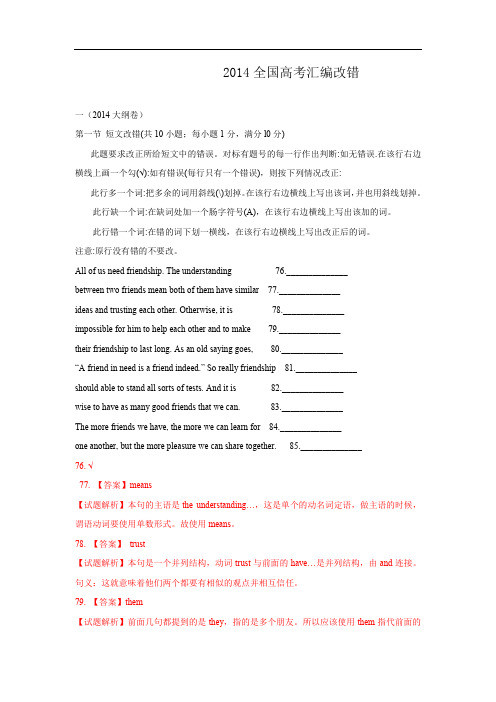
2014全国高考汇编改错一(2014大纲卷)第一节短文改错(共10小题;每小题1分,满分l0分)此题要求改正所给短文中的错误。
对标有题号的每一行作出判断:如无错误.在该行右边横线上画一个勾(√):如有错误(每行只有一个错误),则按下列情况改正:此行多一个词:把多余的词用斜线(\)划掉。
在该行右边横线上写出该词,并也用斜线划掉。
此行缺一个词:在缺词处加一个肠字符号(A),在该行右边横线上写出该加的词。
此行错一个词:在错的词下划一横线,在该行右边横线上写出改正后的词。
注意:原行没有错的不要改。
All of us need friendship. The understanding 76.______________between two friends mean both of them have similar 77.______________ideas and trusting each other. Otherwise, it is 78.______________impossible for him to help each other and to make 79.______________their friendship to last long. As an old saying goes, 80.______________“A friend in need is a friend indeed.” So really friendship 81.______________should able to stand all sorts of tests. And it is 82.______________wise to have as many good friends that we can. 83.______________The more friends we have, the more we can learn for 84.______________one another, but the more pleasure we can share together. 85.______________76. √77. 【答案】means【试题解析】本句的主语是the understanding…,这是单个的动名词定语,做主语的时候,谓语动词要使用单数形式。
高考全国卷(新课标I)英语真题及答案解析
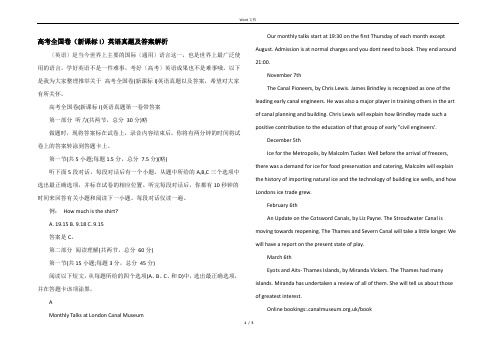
高考全国卷(新课标I)英语真题及答案解析〔英语〕是当今世界上主要的国际〔通用〕语言这一,也是世界上最广泛使用的语言。
学好英语不是一件难事,考好〔高考〕英语成果也不是难事哦。
以下是我为大家整理推举关于高考全国卷(新课标I)英语真题以及答案,希望对大家有所关怀。
高考全国卷(新课标I)英语真题第一卷带答案第一部分听力(共两节,总分30分)略做题时,现将答案标在试卷上,录音内容结束后,你将有两分钟的时间将试卷上的答案转涂到答题卡上。
第一节(共5小题;每题1.5分,总分7.5分)(略)听下面5段对话,每段对话后有一个小题。
从题中所给的A,B,C三个选项中选出最正确选项,并标在试卷的相应位置。
听完每段对话后,你都有10秒钟的时间来回答有关小题和阅读下一小题。
每段对话仅读一遍。
例:How much is the shirt?A. 19.15B. 9.18C. 9.15答案是C。
第二部分阅读理解(共两节,总分60分)第一节(共15小题;每题3分,总分45分)阅读以下短文,从每题所给的四个选项(A、B、C、和D)中,选出最正确选项,并在答题卡该项涂黑。
AMonthly Talks at London Canal MuseumOur monthly talks start at 19:30 on the first Thursday of each month except August. Admission is at normal charges and you dont need to book. They end around 21:00.November 7thThe Canal Pioneers, by Chris Lewis. James Brindley is recognized as one of the leading early canal engineers. He was also a major player in training others in the art of canal planning and building. Chris Lewis will explain how Brindley made such a positive contribution to the education of that group of early "civil engineers'.December 5thIce for the Metropolis, by Malcolm Tucker. Well before the arrival of freezers, there was a demand for ice for food preservation and catering, Malcolm will explain the history of importing natural ice and the technology of building ice wells, and how Londons ice trade grew.February 6thAn Update on the Cotsword Canals, by Liz Payne. The Stroudwater Canal is moving towards reopening. The Thames and Severn Canal will take a little longer. We will have a report on the present state of play.March 6thEyots and Aits- Thames Islands, by Miranda Vickers. The Thames had many islands. Miranda has undertaken a review of all of them. She will tell us about those of greatest interest.Online bookings:/bookMore into:/whatsonLondon Canal Museum12-13 New Wharf Road, London NI 9RT.canalmuseum.mobiTel:020 ********21. When is the talk on James Brindley?A. February 6th.B. March 6th.C. November 7th.D. December 5th.22. What is the topic of the talk in February?A. The Canal Pioneers.B. Ice for the MetropolisC. Eyots and Aits- Thames IslandsD. An Update on the Cotsword Canals23. Who will give the talk on the islands in the Thames.A. Miranda VickersB. Malcolm TuckerC. Chris LewisD. Liz Payne【答案】21. C22. D23. A【解析】试题分析:文章主要介绍了在伦敦运河博物馆每个月的讲座支配。
2014高考新课标1全国卷英语试题和答案解析
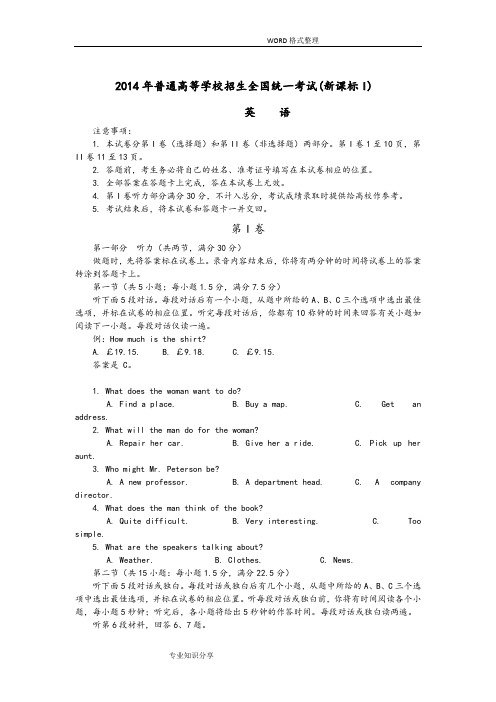
2014年普通高等学校招生全国统一考试(新课标I)英语注意事项:1. 本试卷分第I卷(选择题)和第II卷(非选择题)两部分。
第I卷1至10页,第II卷11至13页。
2. 答题前,考生务必将自己的姓名、准考证号填写在本试卷相应的位置。
3. 全部答案在答题卡上完成,答在本试卷上无效。
4. 第I卷听力部分满分30分,不计入总分,考试成绩录取时提供给高校作参考。
5. 考试结束后,将本试卷和答题卡一并交回。
第I卷第一部分听力(共两节,满分30分)做题时,先将答案标在试卷上。
录音内容结束后,你将有两分钟的时间将试卷上的答案转涂到答题卡上。
第一节(共5小题;每小题1.5分,满分7.5分)听下面5段对话。
每段对话后有一个小题,从题中所给的A、B、C三个选项中选出最佳选项,并标在试卷的相应位置。
听完每段对话后,你都有10称钟的时间来回答有关小题如阅读下一小题。
每段对话仅读一遍。
例:How much is the shirt?A. £19.15.B. £9.18.C. £9.15.答案是 C。
1. What does the woman want to do?A. Find a place.B. Buy a map.C. Get an address.2. What will the man do for the woman?A. Repair her car.B. Give her a ride.C. Pick up her aunt.3. Who might Mr. Peterson be?A. A new professor.B. A department head.C. A company director.4. What does the man think of the book?A. Quite difficult.B. Very interesting.C. Too simple.5. What are the speakers talking about?A. Weather.B. Clothes.C. News.第二节(共15小题:每小题1.5分,满分22.5分)听下面5段对话或独白。
2014全国卷新课标1高考英语试题及答案解析(可打印版)
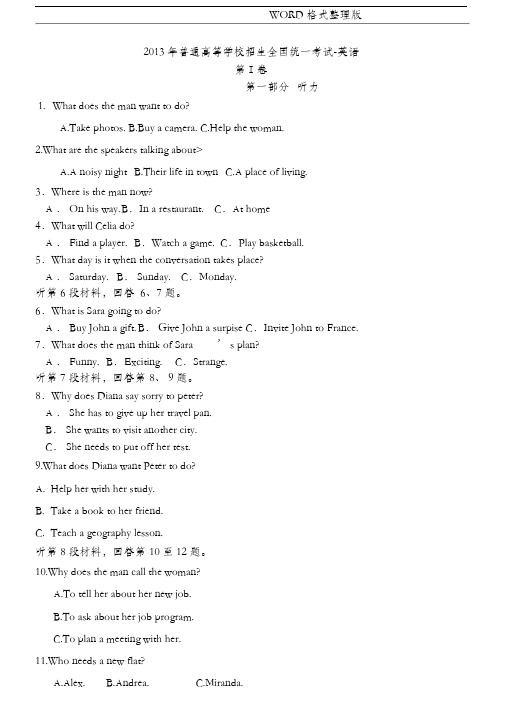
....WORD 格式整理版2013 年普通高等学校招生全国统一考试-英语第Ⅰ卷第一部分听力1. What does the man want to do?A.Take photos.B.Buy a camera.C.Help the woman.2.What are the speakers talking about>A.A noisy nightB.Their life in townC.A place of living. 3.Where is the man now?A . On his way. B.In a restaurant. C.At home4.What will Celia do?A . Find a player. B.Watch a game. C.Play basketball. 5.What day is it when the conversation takes place?A . Saturday. B. Sunday. C.Monday.听第 6 段材料,回答 6、7 题。
6.What is Sara going to do?A . Buy John a gift. B. Give John a surpise C.Invite John to France. 7.What does the man think of Sara ’ s plan?A . Funny. B.Exciting. C.Strange.听第 7 段材料,回答第 8、 9 题。
8.Why does Diana say sorry to peter?A . She has to give up her travel pan.B. She wants to visit another city.C. She needs to put off her test.9.What does Diana want Peter to do?A.Help her with her study.B.Take a book to her friend.C.Teach a geography lesson.听第 8 段材料,回答第 10 至 12 题。
2014年全国高考英语试题及答案-辽宁卷

2014普通高等学校招生全国统一考试(辽宁卷)英语注意事项:1.本试卷分第卷和第卷两部分。
答卷前,考试务必将自己的姓名、准考证号填写在答题卡上。
2.作答时,将答案写在答题卡上。
写在本试卷上无效。
3.考试结束后,将本试卷和卡题卡一并交回。
第二部分阅读理解(共两节,满分40分)第一节(共15小题;每小题2分,满分30分)阅读下列短文,从每题所给的四个选项(A, B, C和D)中.选出最佳选项,并在答题卡上将该项涂黑。
AA new study shows students who write notes by hand during lectures perform better on exams than those who use laptops(笔记本电脑).Students arc increasingly using laptops for note-taking because of speed and legibility(清晰度).But the research has found laptop users are less able to remember and apply the concepts they have been taught.Researchers performed experiments that aimed to find out whether using a laptop increased the tendency to make notes "mindlessly" by taking down word for word what the professors said In the first experiment, students were given either a laptop or pen and paper .They listened to the same lectures and were told to use their usual note-taking skills. Thirty minutes after the talk , they were examined on their ability to remember facts and on how well they understood concepts.The researchers found that laptop users took twice as many notes as those who wrote by hand. However, the typists performed worse at remembering and applying the concepts. Both groups scored similarly when it came to memorizing facts.The researchers' report said, "While more notes are beneficial, if the notes are taken mindlessly, as is more likely the case on a laptop, the benefit disappears."In another experiment aimed at testing long-term memory, students took notes as before but were tested aweek after the lecture. This time, the students who wrote notes by hand performed significantly better on the exam.These two experiments suggest that handwritten notes are not only better for immediate learning and understanding, but that they also lead to superior revision in the future.21. More and more students favor laptops for note-taking because they can . .A. write more notesB. digest concepts betterC. get higher scoresD. understand lectures better22. While taking notes, laptop users tend to be . .A. skillfulB. mindlessC. thoughtfulD. tireless23. The author of the passage aims to . .A. examine the importance of long-term memoryB. stress the benefit of taking notes by handC. explain the process of taking notesD. promote the use of laptops24. The passage is likely to appear in . .A. a newspaper advertisementB. a computer textbookC. a science magazineD. a finance reportB(Q = Question; A = Answer)Situation IQ: If someone sits right next to me in an empty movie theater, is it rude to move?A: Maybe, but nobody will fault you for it. Chances are that close sitter doesn't realize he disturbs you, so he maymiss your annoyance. You undoubtedly aren't the first person he's met who needs enough room. Forgive hisbad judgment, move quietly and enjoy the show.Situation IIQ: If I use the bathroom at a store, do I need to buy something?A: Consider frequency and urgency. Is this a one-time or an emergency? If so, you don't have to buy anything, butit would be kind if you did. However, if you regularly use the bathroom at this place, then you are acustomer,and you should act like one.Situation IIIQ: If someone is talking loudly on the bus, is there a nice way to ask him to keep it down?A: No. Try other means.1) Stare at him until he gets aware of it and quiets down. 2) Lift your finger in a silencemotion(动作)and smile. 3) Put on earphones and ignore him.Situation IVQ: If I remember my friend's birthday a day late, should I apologize or just wish her a happy birthday like nothinghappened?A: This is the reason why the word belated was invented. "Happy belated birthday!" is short for: "Well, I know Iforgot, but then I remembered. Forgive me and happy birthday."Situation VQ: Can I lie about seeing a text because I was too busy or lazy to respond(回复) to it?A: Don't lie. Receiving a text does not mean you need to respond to it. Why waste a perfectly good lie when thetruth will serve? "Yes," you can say if ever asked, "I saw it." No explanation is needed as to why you don'trespond.25. You will get annoyed in a theater when . .A. a person is too activeB. a person is too rude to youC. a person talks too loudlyD. a person sits too close to you26. How will you quiet someone down in a public place?A. By making fun of him continuously.B. By looking purposefully at him.C. By talking to him directly.D. By pointing angrily at him.27. The underlined word "belated" in Situation IV probably means ..A. predictedB. returnedC. cancelledD. delayed28. What is the passage mainly about?A. Modern ways to mind your manners.B. Different ways to change others' manners.C. Proper manners to offer help to others.D. Good manners to talk to people.CWould it surprise you to learn that, like animals, trees communicate with each other and pass on their wealth to the next generation?UBC Professor Simard explains how trees are much more complex than most of us ever imagined. Although Charles Darwin thought that trees are competing for survival of the fittest, Simard shows just how wrong he was. In fact, the opposite is true: trees survive through their co-operation and support, passing around necessary nutrition "depending on who needs it".Nitrogen (氮) and carbon are shared through miles of underground fungi (真菌) networks, making sure that all trees in the forest ecological system give and receive just the right amount to keep them all healthy. This hidden system works in a very similar way to the networks of neurons (神经元) in our brains, and when one tree is destroyed, it affects all.Simard talks about "mother trees", usually the largest and oldest plants on which all other trees depend. She explains how dying trees pass on the wealth to the next generation, transporting important minerals to young trees so they may continue to grow. When humans cut down "mother trees" with no awareness of these highly complex "tree societies" or the networks on which they feed, we are reducing the chances of survival for the entire forest."We didn't take any notice of it" Simard says sadly. "Dying trees move nutrition into the young trees before dying, but we never give them chance." If we could put across the message to the forestry industry, we could make a huge difference towards our environmental protection efforts for the future.29. The underlined sentence "the opposite is true" in Paragraph 2 probably means that trees .A. compete for survivalB. protect their own wealthC. depend on each otherD. provide support for dying trees30. "Mother trees" are extremely important because they .A. look the largest in size in the forestB. pass on nutrition to young treesC. seem more likely to be cut down by humansD. know more about the complex "tree societies"31. The underlined word "it" in the last paragraph refers to .A. how "tree societies" workB. how trees grow oldC. how forestry industry developsD. how young trees survive32. What would be the best title for the passage?A. Old Trees Communicate Like HumansB. Young Trees Are In Need Of ProtectionC. Trees Are More Awesome Than You ThinkD. Trees Contribute To Our SocietyDTravis is the manager of G&G where he is responsible for forty employees (雇员)and profits (利润) of over $2 million per year. He's never late to work. He does not get upset on the job. When one of his employees started crying after a customer screamed at her, Travis took her away. "Your working uniform is your shelter," he told her. "Nothing anyone says will ever hurt you. You will always be as strong as you want to be."Travis picked up that lecture in one of his G&G training courses, an education program that began on his first day and continues throughout an employee's occupation. The training has, Travis says, changed his life. G&G has taught him how to live, how to focus, how to get to work on time, and how to master his emotions (情绪). Most importantly, it taught him willpower.At the center of that education is an extreme focus on an all-important habit; willpower. Dozens of cases show that willpower is the single most important habit for a person's success.And the best way to strengthen willpower is to make it into a habit. "Sometimes it looks like people with great self-control aren't working hard—but that's because they've made it automatic," Angela Duckworth, one of the University of Pennsylvaniaresearchers said. "Their willpower occurs without them having to think about it."The company spent millions of dollars developing programs of study to trainemployees on self-control. Managers wrote workbooks that serve as guides to how to make willpower a habit in workers' lives. Those courses arc, in part, why G&G has grown from a sleepy company into a largeone with more than seventeen thousand stores and profits of more than $10 billion a year.33. We loam from Paragraph 2 that employees in G&G must .A. learn to give lecturesB. attend education programsC. design a working uniformD. develop a common hobby34. Willpower will become a habit when employees can .A. focus on the profitsB. benefit from the jobC. protect themselves wellD. control their feeling well35. What can we infer from the passage?A. G&G has grown into a large company.B. G&G will spend half its profits training employees.C. G&G may become more successful in the future.D. G&G has to produce more workbooks for managers.第二节(共5小题;每小题2分, 满分10分)根据短文内容,从短文后的选项中选出能填入空白处的最佳选项,并在答题卡上将该项涂黑。
2014高考新课标1全国卷英语试题和答案解析

2014年普通高等学校招生全国统一考试(新课标I)英语注意事项:1. 本试卷分第I卷(选择题)和第II卷(非选择题)两部分。
第I卷1至10页,第II 卷11至13页。
2. 答题前,考生务必将自己的姓名、准考证号填写在本试卷相应的位置。
3. 全部答案在答题卡上完成,答在本试卷上无效。
4. 第I卷听力部分满分30分,不计入总分,考试成绩录取时提供给高校作参考。
5. 考试结束后,将本试卷和答题卡一并交回。
第I卷第一部分听力(共两节,满分30分)做题时,先将答案标在试卷上。
录音内容结束后,你将有两分钟的时间将试卷上的答案转涂到答题卡上。
第一节(共5小题;每小题1.5分,满分7.5分)听下面5段对话。
每段对话后有一个小题,从题中所给的A、B、C三个选项中选出最佳选项,并标在试卷的相应位置。
听完每段对话后,你都有10称钟的时间来回答有关小题如阅读下一小题。
每段对话仅读一遍。
例:How much is the shirt?A. £19.15.B. £9.18.C. £9.15.答案是C。
1. What does the woman want to do?A. Find a place.B. Buy a map.C. Get an address.2. What will the man do for the woman?A. Repair her car.B. Give her a ride.C. Pick up her aunt.3. Who might Mr. Peterson be?A. A new professor.B. A department head.C. A company director.4. What does the man think of the book?A. Quite difficult.B. Very interesting.C. Too simple.5. What are the speakers talking about?A. Weather.B. Clothes.C. News.第二节(共15小题:每小题1.5分,满分22.5分)听下面5段对话或独白。
2014年高考英语试题全国卷1
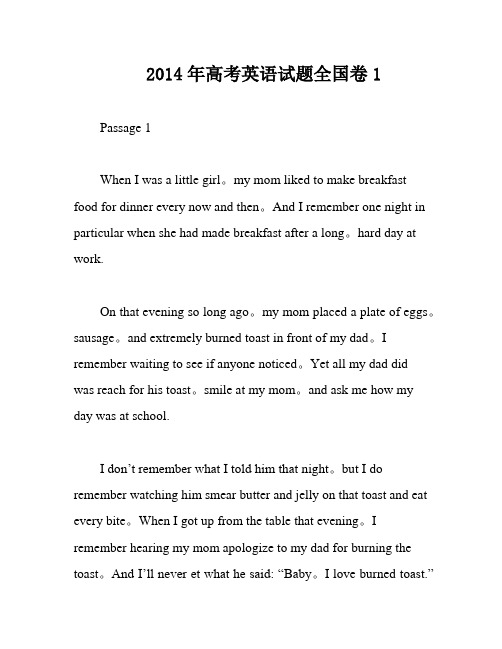
2014年高考英语试题全国卷1Passage 1When I was a little girl。
my mom liked to make breakfast food for dinner every now and then。
And I remember one night in particular when she had made breakfast after a long。
hard day at work.On that evening so long ago。
my mom placed a plate of eggs。
sausage。
and extremely burned toast in front of my dad。
I remember waiting to see if anyone noticed。
Yet all my dad didwas reach for his toast。
smile at my mom。
and ask me how my day was at school.I don’t remember what I told him that night。
but I do remember watching him smear butter and jelly on that toast and eat every bite。
When I got up from the table that evening。
I remember hearing my mom apologize to my dad for burning the toast。
And I’ll never et what he said: “Baby。
I love burned t oast.”Later that night。
I went to kiss Daddy good night and I asked him if he really liked his toast burned。
2014年高考新课标I全国卷英语试题与答案

2014年普通高等学校招生全国统一考试(全国卷)英语试题第一卷(选择题,满分115分)第一部分:听力(共两节,满分30分)第一节(共5小题;每小题1.5分,满分7.5分)听下面5段对话。
每段对话后有一个小题,从题中所给的A、B、C三个选项中选出最佳选项,并标在试卷的相应位置。
听完每段对话后,你都有10秒钟时间来回答有关小题和阅读下一小题。
每段对话仅读一遍。
1.Where will the woman go first?A.To the schoolB.T o a friend’s house.C.To the post office.2.What do we know about Jessie?A.She likes long camping trips.B.She hasn’t gone camping for weeks.C.It takes her a long time to plan her camping.3.What’s the weather like this week?A.Rainy.B.Sunny.C.Windy.4.How much is a pound of potatoes now?A.Eighty cents.B.Thirty cents.C.Sixty cents.5.What do we know from the conversation?A.The woman will be about 10 minutes late.B.The woman will be at least 30 minutes late.C.The woman will get there in 30 minutes.第二节(共15小题;每小题1.5分,满分22.5分)听下面5段对话或独白。
每段对话或独白后有几个小题,从题中所给的A、B、C三个选项中选出最佳选项,并标在试卷的相应位置。
听完每段对话或独白前,你将有时间阅读各个小题,每小题5秒钟;听完后,各个小题将给出5秒钟的作答时间。
(完整word版)江苏2014年高考英语试题及答案
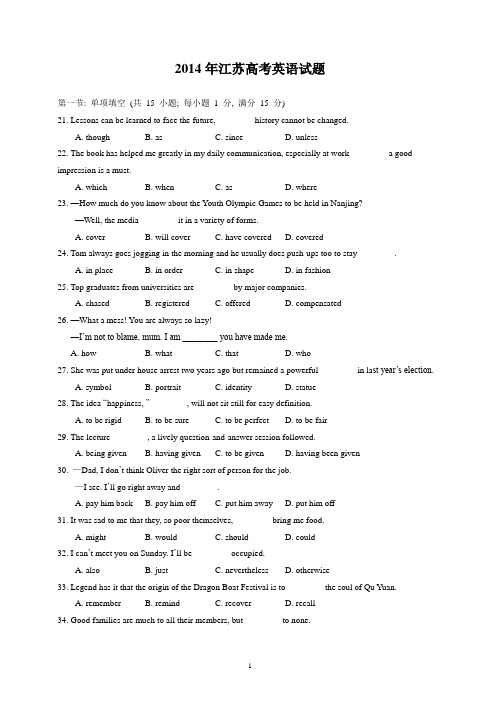
2014年江苏高考英语试题第一节: 单项填空(共15 小题; 每小题1 分, 满分15 分)21. Lessons can be learned to face the future, ________ history cannot be changed.A. thoughB. asC. sinceD. unless22. The book has helped me greatly in my daily communication, especially at work ________ a good impression is a must.A. whichB. whenC. asD. where23. —How much do you know about the Youth Olympic Games to be held in Nanjing?—Well, the media ________ it in a variety of forms.A. coverB. will coverC. have coveredD. covered24. Tom always goes jogging in the morning and he usually does push-ups too to stay ________.A. in placeB. in orderC. in shapeD. in fashion25. Top graduates from universities are ________ by major companies.A. chasedB. registeredC. offeredD. compensated26. —What a mess! You are always so lazy!—I’m not to blame, mum. I am ________ you have made me.A. howB. whatC. thatD. who27. She was put under house arrest two years ago but remained a powerful ________ in la st year’s election.A. symbolB. portraitC. identityD. statue28. The idea “happiness, ” ________, will not sit still for easy definition.A. to be rigidB. to be sureC. to be perfectD. to be fair29. The lecture ________, a lively question-and-answer session followed.A. being givenB. having givenC. to be givenD. having been given30. —Dad, I don’t think Oliver the right sort of person for the job.—I see. I’ll go right away and ________.A. pay him backB. pay him offC. put him awayD. put him off31. It was sad to me that they, so poor themselves, ________ bring me food.A. mightB. wouldC. shouldD. could32. I can’t meet you on Sunday. I’ll be ________ occupied.A. alsoB. justC. neverthelessD. otherwise33. Legend has it that the origin of the Dragon Boat Festival is to ________ the soul of Qu Yuan.A. rememberB. remindC. recoverD. recall34. Good families are much to all their members, but ________ to none.A. somethingB. anythingC. everythingD. nothing35. —________ ! Somebody has left the lab door open.—Don’t look at me.A. Dear meB. Hi, thereC. Thank goodnessD. Come on第二节: 完形填空(共20 小题; 每小题1 分, 满分20 分)Dale Carnegie rose from the unknown of a Missouri farm to international fame because he found a way to fill a universal human need.It was a need that he first 36 back in 1906 when young Dale was a junior at State Teachers College in Warrensburg. To get an 37 , he was struggling against many difficulties. His family was poor. His Dad couldn’t afford the 38 at college, so Dale had to ride horseback 12 miles to attend classes. Study had to be done 39 his farm-work routines. He withdrew from many school activities 40 he didn’t have the time or the 41 . He had only one good suit. He tried 42 the football team, but the coach turned him down for being too 43 . During this period Dale was slowly 44 an inferiority complex (自卑感), which his mother knew could 45 him from achieving his real potential. She 46 that Dale join the debating team, believing that 47 in speaking could give him the confidence and recognition that he needed.Dale took his mother’s advice, tried desperately and after several attempts 48 made it. This proved to be a 49 point in his life. Speaking before groups did help him gain the 50 he needed. By the time Dale was a senior, he had won every top honor in 51 . Now other students were coming to him for coaching and they, 52 , were winning contests.Out of this early struggle to 53 his feelings of inferiority, Dale came to understand that the ability to 54 an idea to an audience builds a person’s confidence. And, 55 it, Dale knew he could do anything he wanted to do—and so could others.36. A. admitted B. filled C. supplied D. recognized37. A. assignment B. education C. advantage D. instruction38. A. training B. board C. teaching D. equipment39. A. between B. during C. over D. through40. A. while B. when C. because D. though41. A. permits B. interest C. talent D. clothes42. A. on B. for C. in D. with43. A. light B. flexible C. optimistic D. outgoing44. A. gaining B. achieving C. developing D. obtaining45. A. prevent B. protect C. save D. free46. A. suggested B. demanded C. required D. insisted47. A. presence B. practice C. patience D. potential48. A. hopefully B. certainly C. finally D. naturally49. A. key B. breaking C. basic D. turning50. A. progress B. experience C. competence D. confidence51. A. horse-riding B. football C. speech D. farming52. A. in return B. in brief C. in turn D. in fact53. A. convey B. overcome C. understand D. build54. A. express B. stress C. contribute D. repeat55. A. besides B. beyond C. like D. with第三部分: 阅读理解(共15 小题; 每小题2 分, 满分30 分)请阅读下列短文, 从短文后各题所给的A、B、C、D 四个选项中, 选出最佳选项, 并在答题卡上将该项涂黑。
2014年江苏高考英语试卷(含答案)

2014年江苏高考英语试卷(含答案)2014年江苏高考英语试题第一部分听力(共两节,满分20 分)做题时,先将答案标在试卷上。
录音内容结束后,你将有两分钟的时间将试卷上的答案转涂到答题卡上。
第一节(共 5 小题;每小题 1 分,满分 5 分)听下面 5 段对话。
每段对话后有一个小题,从题中所给的A、B、C 三个选项中选出最佳选项,并标在试卷的相应位置。
听完每段对话后,你都有10 秒钟的时间来回答有关小题和阅读下一小题。
每段对话仅读一遍。
例: How much is the shirt?A. £ 19. 15.B. £ 9. 18.C. £ 9. 15.答案是C。
1. What does the woman want to do?A. Find a place.B. Buy a map.C. Get an address.2. What will the man do for the woman?A. Repair her car.B. Give her a ride.C. Pick up her aunt.3. Who might Mr. Peterson be?A. A new professor.B. A department head.C.A company director.4. What does the man think of the book?A. Quite difficult.B. Very interesting.C. Too simple.5. What are the speakers talking about?A. Weather.B. Clothes.C. News.第二节(共15 小题;每小题 1 分,满分15 分)听下面 5 段对话或独白。
每段对话或独白后有几个小题,从题中所给的A、B、C 三个选项中选出最佳选项,并标在试卷的相应位置。
2014年高考英语山东卷(含详细答案)
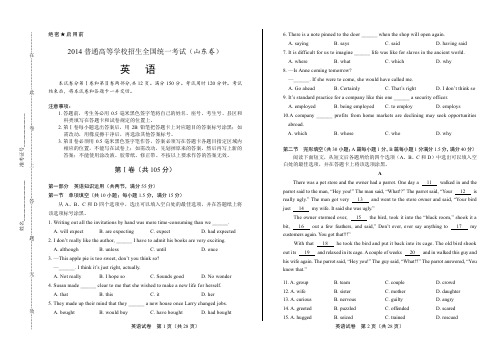
英语试卷 第1页(共28页)英语试卷 第2页(共28页)绝密★启用前 2014普通高等学校招生全国统一考试(山东卷)英语本试卷分第Ⅰ卷和第Ⅱ卷两部分,共12页。
满分150分。
考试用时120分钟。
考试结束后,将本试卷和答题卡一并交回。
注意事项:1. 答题前,考生务必用0.5毫米黑色签字笔将自己的姓名、座号、考生号、县区和科类填写在答题卡和试卷规定的位置上。
2. 第Ⅰ卷每小题选出答案后,用2B 铅笔把答题卡上对应题目的答案标号涂黑;如需改动,用橡皮擦干净后,再选涂其他答案标号。
3. 第Ⅱ卷必须用0.5毫米黑色签字笔作答,答案必须写在答题卡各题目指定区域内相应的位置,不能写在试卷上;如需改动,先划掉原来的答案,然后再写上新的答案;不能使用涂改液、胶带纸、修正带。
不按以上要求作答的答案无效。
第Ⅰ卷(共105分)第一部分 英语知识运用(共两节,满分55分)第一节 单项填空(共10小题;每小题1.5分,满分15分)从A 、B 、C 和D 四个选项中,选出可以填入空白处的最佳选项,并在答题纸上将该选项标号涂黑。
1. Writing out all the invitations by hand was more time-consuming than we ______. A. will expect B. are expecting C. expect D. had expected2. I don’t really like the author, ______ I have to admit his books are very exciting. A. althoughB. unlessC. untilD. once3. —This apple pie is too sweet, don’t you think so? —______. I think it’s just right, actually. A. Not really B. I hope so C. Sounds good D. No wonder4. Susan made ______ clear to me that she wished to make a new life for herself. A. thatB. thisC. itD. her 5. They made up their mind that they ______ a new house once Larry changed jobs. A. boughtB. would buyC. have boughtD. had bought6. There is a note pinned to the door ______ when the shop will open again. A. sayingB. saysC. saidD. having said 7. It is difficult for us to imagine ______ life was like for slaves in the ancient world. A. whereB. whatC. whichD. why8. —Is Anne coming tomorrow?—______. If she were to come, she would have called me. A. Go ahead B. CertainlyC. That’s rightD. I don’t think so 9. It’s standard practice for a company like this one ______ a security officer.A. employedB. being employedC. to employD. employs10. A company ______ profits from home markets are declining may seek opportunitiesabroad. A. whichB. whoseC. whoD. why第二节 完形填空(共30小题;A 篇每小题1分,B 篇每小题1分满分1.5分,满分40分)阅读下面短文,从短文后各题所给的四个选项(A 、B 、C 和D )中选出可以填入空白处的最佳选项,并在答题卡上将该选项涂黑。
2014年浙江省高考英语试卷及答案(全国统一考试)
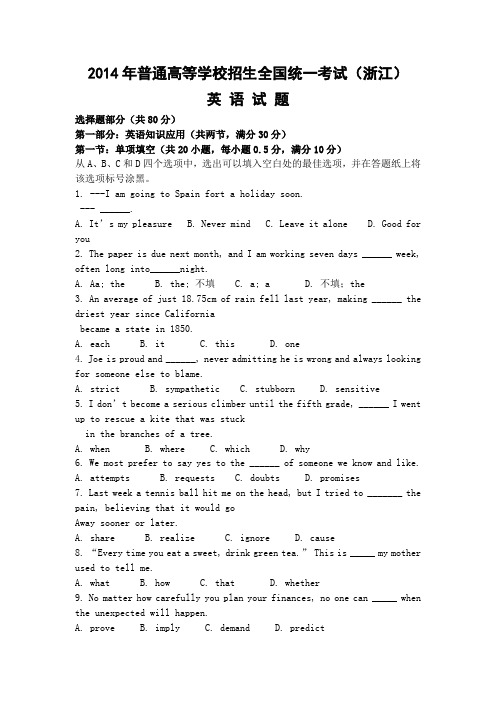
2014年普通高等学校招生全国统一考试(浙江)英语试题选择题部分(共80分)第一部分:英语知识应用(共两节,满分30分)第一节:单项填空(共20小题,每小题0.5分,满分10分)从A、B、C和D四个选项中,选出可以填入空白处的最佳选项,并在答题纸上将该选项标号涂黑。
1. ---I am going to Spain fort a holiday soon.--- ______.A. It’s my pleasureB. Never mindC. Leave it aloneD. Good for you2. The paper is due next month, and I am working seven days ______ week, often long into______night.A. Aa; theB. the; 不填C. a; aD. 不填;the3. An average of just 18.75cm of rain fell last year, making ______ the driest year since Californiabecame a state in 1850.A. eachB. itC. thisD. one4. Joe is proud and ______, never admitting he is wrong and always looking for someone else to blame.A. strictB. sympatheticC. stubbornD. sensitive5. I don’t become a serious climber until the fifth grade, ______ I went up to rescue a kite that was stuckin the branches of a tree.A. whenB. whereC. whichD. why6. We most prefer to say yes to the ______ of someone we know and like.A. attemptsB. requestsC. doubtsD. promises7. Last week a tennis ball hit me on the head, but I tried to _______ the pain, believing that it would goAway sooner or later.A. shareB. realizeC. ignoreD. cause8. “Every time you eat a sweet, drink green tea.”This is _____ my mother used to tell me.A. whatB. howC. thatD. whether9. No matter how carefully you plan your finances, no one can _____ when the unexpected will happen.A. proveB. implyC. demandD. predict10. While staying in the village, James unselfishly shared whatever he had with the villagers withoutAsking for anything ______ .A. in returnB. in commonC. in turnD. in place11. Sofia looked around at all the faces: she had the impression that she _____ most of the guests before.A. has seenB. had seenC. sawD. would see12. Facing up to your problem ____ running away from them is the best approach to working things out.A. more thanB. rather thanC. along withD.or rather13. The aim of education is to teach young people to think for themselves and not follow others ______ .A. blindlyB. unwillinglyC. closelyD. carefully14. Annie Salmon, disabled, is attended throughout her school days by a nurse _______ to guard her.A. to appointB. appointingC. appointedD. having appointed15. Cathy had quit her job when her son was born _______ she could stay home and raise her family.A.now thatB. as ifC. only ifD. so that16. They were abroad during the months when we were carrying out the investigation, or they _____ toour help.A. would have comeB. could comeC. have comeD. had come17. People won’t pay attention to you when they still have a lot of ideas of their own crying _______expression.A. fromB. overC. withD. for18. There’s no reason to be disappointed. ______, this could be rather amusing.A. Above allB. As a resultC. In additionD. As a matter of fact19. How could you ______ such a fantastic job when you have been out of work for months.A. turn offB. turn inC.turn downD. turn to20. —I’d like a wake-up call at 7:00 a.m., please!—OK, _______.A. help yourselfB. You will certainly make itC. just do what you likeD. I’ll make sure you get one第二节:完形填空(共20小题;每小题1分,满分20分)阅读下面短文,掌握其大意,然后从21—40各题所给的四个选项中(A、B、C 和D)中,选出最佳选项,并在答题纸上将该选项标号涂黑。
2014全国卷新课标1高考英语试题及答案解析(可打印版)
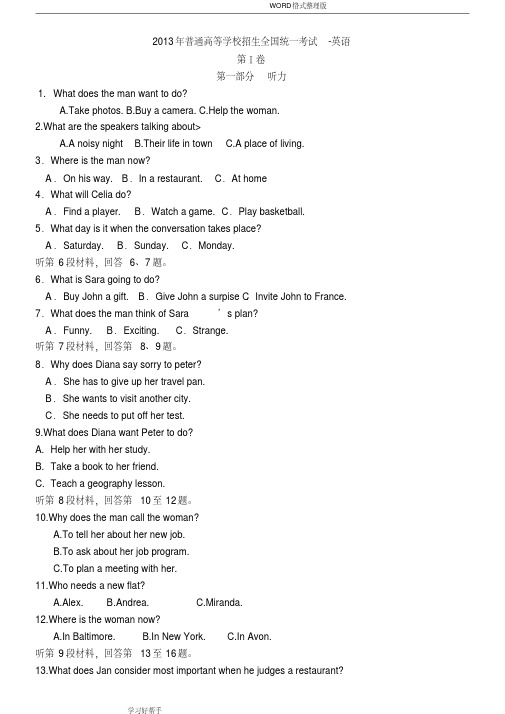
2013年普通高等学校招生全国统一考试-英语第Ⅰ卷第一部分听力1.What does the man want to do?A.Take photos.B.Buy a camera.C.Help the woman.2.What are the speakers talking about>A.A noisy nightB.Their life in townC.A place of living. 3.Where is the man now?A.On his way. B.In a restaurant. C.At home4.What will Celia do?A.Find a player. B.Watch a game. C.Play basketball. 5.What day is it when the conversation takes place?A.Saturday. B.Sunday. C.Monday.听第6段材料,回答6、7题。
6.What is Sara going to do?A.Buy John a gift. B.Give John a surpise C.Invite John to France. 7.What does the man think of Sara’s plan?A.Funny. B.Exciting. C.Strange.听第7段材料,回答第8、9题。
8.Why does Diana say sorry to peter?A.She has to give up her travel pan.B.She wants to visit another city.C.She needs to put off her test.9.What does Diana want Peter to do?A.Help her with her study.B.Take a book to her friend.C.Teach a geography lesson.听第8段材料,回答第10至12题。
- 1、下载文档前请自行甄别文档内容的完整性,平台不提供额外的编辑、内容补充、找答案等附加服务。
- 2、"仅部分预览"的文档,不可在线预览部分如存在完整性等问题,可反馈申请退款(可完整预览的文档不适用该条件!)。
- 3、如文档侵犯您的权益,请联系客服反馈,我们会尽快为您处理(人工客服工作时间:9:00-18:30)。
试卷类型:B2014年普通⾼等学校招⽣全国统⼀考试(新课标I)英语注意事项:1. 本试卷分第Ⅰ卷(选择题)和第Ⅱ卷(⾮选择题)两部分。
第Ⅰ卷1页⾄10页,第Ⅱ卷11页⾄13页。
2. 答题前,考⽣务必将⾃⼰的姓名,准考证号填写在本试卷相应的位置。
3. 全部答案在答题卡上完成,搭载本试卷上⽆效。
4. 第Ⅰ卷听⼒部分满分30分,不计⼊总分,考试成绩录取时提供给⾼校作参考。
5. 考试结束后,将本试卷和答题卡⼀并交回。
第Ⅰ卷第⼀部分听⼒(共两节,满分30分)做题时,现将答案标在试卷上,录⾳内容结束后,你将有两分钟的时间将试卷上的答案转涂到答题卡上。
⼀.(共5⼩题;每⼩题1.5分,满分7.5分)听下⾯5段对话,每段对话后有⼀个⼩题。
从题中所给的A,B,C三个选项中选出最佳选项,并标在试卷的相应位置。
听完每段对话后,你都有10秒钟的时间来回答有关⼩题和阅读下⼀⼩题。
每段对话仅读⼀遍。
例:How much is the shirt?A.£ 19.15B.£ 9.18C.£ 9.15答案是C。
1.What does the woman want to do ?A. Find a placeB. Buy a mapC.Get an address2. What will the man do for the woman?A. Repair her carB.Give her a rideC.Pick up a aunt3. Who might Mr Peterson be?A. new professorB.A department headC.A company director4. What does the man think of the book?A.Quite differentB.Very interestingC.Too simple5.What are the speakers talking about?A.WeatherB.Clothes.C.News.第⼆节(共15⼩题;每⼩题1.5分,满分22.5分)听下⾯5段对话。
每段对话或独⽩后有⼏个⼩题,从题中所给的、B、C三个选项中选出最佳选项,并标在试卷的相应位置。
听每段对话或独⽩前,将有时间阅读各个⼩题,每⼩题5秒钟;听完后,各⼩题给出5秒钟的作答时间。
每段对话或独⽩读两遍。
听第6段材料,回答第6、7题。
6.Why is Harry unwilling to join the woman?A.He has a pain in his knee.B.He wants to watch TV.C.He is too lazy.7.What will the woman probably do next?A.Stay at home.B.Take Harry to hospital.C.Do some exercise.听第7段材料,回答第8、9题。
8.When will the man be home from work?A.At 5:45.B. At 6:15.C. At 6:50.9.Where will the speaker go?A.The Green House Cinema.B.The New State Cinema.C.The UME Cinema.听第8段材料,回答第10⾄12题。
10.How will the speakers go to New York?A.By air.B. By taxi.C. By bus.11.Why are the speakers making the trip?A.For business.B. For shopping.C. For hoilday.12.What is the probable relationship between the speakers?A.Driver and passenger.B. Husband and wife.C. Fellow workers.听第9段材料,回答第13⾄16题。
13. Where does this conversation probably take place?A. In a restaurant.B. In an office.C. In a classroom.14. What does John do now?A. He’s a trainer.B. He’s a tour guide.C. He’s a college student.15. How much can a new person earn for the first year?A. $10,500.B. $12,000.C. $15,000.16. How many people will the woman hire?A. Four.B. Three.C. Two.听第10段材料,回答第17⾄20题。
17.How long has the speaker lived in a big city?A. One year.B. Ten years.C. Eighteen years.18. What is the speaker’s opinion on public transport?A. It’s comfortable.B. It’s time-saving.C. It’s cheap.19. What is good about living in a small town?A. It’s safer.B. It’s healthier.C. It’s more convenient.20. What kind of life does the speaker seem to like most?A. Busy.B. Colorful.C. Quiet.第⼆部分阅读理解(共两节,满分60分)⼀.(共15⼩题;每⼩题3分,满分45分)阅读下列短⽂,从每题所给的四个选项(A、B、C、和D)中,选出最佳选项,并在答题卡上将该项涂⿊。
AThe Cambridge Science Festival Curiosity ChallengeDare to Take the Curiosity Challenge!The Cambridge Science Festival (CSF) is pleased to inform you of the sixth annualCuriosity Challenge. The challenge invites, even dares school students between the ages of 5 and 14 to create artwork or a piece of writing that shows their curiosity and how it inspires them to explore their world.Students are being dared to draw a picture, write an article, take a photo or write a poem that shows what they are curious about. To enter the challenge, all artwork or pieces of writing should be sent to the Cambridge Science Festival, MIT Museum, 265 Mass Avenue. Cambridge 02139 by Friday, February 8th.Students who enter the Curiosity Challenge and are selected as winners will be honored at a special ceremony during the CSF on Sunday, April 21st. Guest speaker will also present prizes to the students. Winning entries will be published in a book. Student entries will be exhibit and prizes will be given. Families of those who take part will be included in the celebration and brunch will be served.Between March 10th and March 15th, each winner will be given the specifics of the closing ceremony and the Curiosity Challenge celebration. The program guidelines and other related information are available at: .21. Who can take in the Curiosity Challenge?A. School students.B. Cambridge locals.C. CSF winners.D. MIT artists.22. When will the prize-giving ceremony be held?A. On February 8th.B. On March 10thC. On March 15th..D. On April 21st.23.What type of writing is this text?A. An exhibition guide.B. An art show review.C. An announcement.D. An official report. BPassenger pigeons(旅鸽)once flew over much of the United States in unbelievable numbers. Written accounts from the 18th and 19th centuries described flocks(群)so large that they darkened the sky for hours.It was calculated that when its population reach its highest point, there were more than 3 billion passenger pigeons – a number equal to 24 to 40 percent of the total bird population in the United States, making it perhaps the most abundant birds in the world. Even as late as 1870 when their numbers had already become smaller, a flock believed to be 1 mile wide and 320 miles (about 515 kilometers) long was seen near Cincinnati.Sadly, the abundance of passenger pigeons may have been their undoing. Where the birds were abundant, people believed there was an ever-lasting supply and killed them by the thousands. Commercial hunters attracted them to small clearings with grain, waited until pigeons had settled to feed, then threw large nets over them, taking hundreds at a time. The birds were shipped to large cities and sold in restaurants.By the closing decades of the 19th century, the hardwood forests where passenger pigeons nested had been damaged by Americans’ need for wood, which scattered(驱散)the flocks and forced the birds to go farther north, where cold temperatures and spring storms contributed to their decline. Soon the great flocks were gone, never to be seen again.In 1897, the state of Michigan passed a law prohibiting the killing of passenger pigeons, but by then, no sizable flocks had been seen in the state for 10 years. The last confirmed wild pigeon in the United States was shot by a boy in Pike County, Ohio, in 1900. For a time, a few birds survived under human care. The last of them, known affectionately as Martha, died at the Cincinnati Zoological Garden in September 1, 1914.24. In the 18th and early 19th centuries, passenger pigeons _______.A. were the biggest bird in the worldB. lived mainly in the south of AmericaC. did great harm to the natural environmentD. Were the largest population in the US25.The underlined word “undoing” probably refers to the pigeons’ _______.A. escapeB. ruinC. liberationD. evolution26.What was the main reason for people to kill passenger pigeons?A. To seek pleasure.B. To save other birds.C. To make money.D. To protect crops.27 What can we infer about the law passed in Michigan?A. It was ignored by the public.B. It was declared too late.C. It was unfair.D. It was strict.CA typical lion tamer (驯兽师) in people’s mind is an entertainer holding a whip (鞭⼦)and a chair .The whip get all of the attention , but it’s mostly for show .In reality , it’s the chair that does the important work .When a lion tamer holds a chair in front of the lion’s face , the lion tries to focus on all four legs of the chair at the same time .With its focus divided , the lion becomes confused and is unsure about what to do next .When faced with so many options , the lion chooses to freeze and wait instead of attacking the man holding the chair. How often do you find yourself in the same position as the lion ? How often do you have something you want to achiever (e,g. lose weight , start a business , travel more ) –only to end up confused by all of the options in front of you and never make progress ?This upsets me to no end because while all the experts are busy debating about which option is best , the people who want to improve their lives are left confused by all of the conflicting information .The end result is that we feel like we can’t focus or that we’re focused on the wrong things , and so we take less action , make less progress , and stay the same when we could be improving .It doesn’t have to be that way .Anytime you find the world waving a chair in your face , remember this :All you need to do is focus on one thing .You just need to get started .Starting before you feel ready is one of the habits of successful people .If you have somewhere you want to go , something you want to accomplish , someone you want to become ….take immediate action .If you’re clear about where you want to go , the rest of the world will either help you get there or get out the way .28. Why does the lion tamer use a chair?A. To trick the lion.B. To show off his skill .C. To get ready for a fight.D. To entertain the audience.29. In what sense are people similar to a lion facing a chair?A. They feel puzzled over choices.B. They hold on to the wrong things.C. They find it hard to make changes.D. They have to do something for show.30. What is the author’s attitude towards the experts mentioned in paragraph 3?A. TolerantB. DoubtfulC. RespectfulD. Supportive31. When the world is “waving a chair in your face”, you’re advised to_____.A. wait for a better chanceB. break your old habitsC. make a quick decisionD. ask for clear guidanceDAs more and more people speak the global languages of English, Chinese, Spanish, and Arabic, other languages are rapidly disappearing. In fact, half of the 6,000-7,000 languages spoken around the world today will likely die out by the next century, according to the United Nations Educational, Scientific, and Cultural Organization (UNESCO).In an effort to prevent language loss, scholars from a number of organizations- UNESCO and National Geographic among them –have for many years been documenting dying languages and the cultures they reflect.Mark Turin, a scientist at the Macmillan Center, Yale University, who specializes in the languages and oral traditions of the Himalayas, is following in that tradition. His recently published book, A Grammar of Thangmi with an Ethnolinguistic Introduction to the Speakers and Their Culture, grows out of his experience living, looking and raising a family in a village in Nepal.Documenting the Tangmi language and culture is just a starting point for Turin, who seeksto include other languages and oral traditions across the Himalayans reaches of India, Nepal, Bhutan, and China. But he is not content to simply record these voices before they disappear without record.At the University of Cambridge Turin discovered a wealth of important materials- including photographs, films, tap recordings, and field notes- which had remained unstudied and were badly in need of care and protection.Now, through the two organizations that he has founded-the Digital Himalaya Project and the World Oral Literature Project- Turin has started a campaign to make such documents, found in libraries and stores around the world, available not just to scholars but to the youngers.Generations of communities from whom the materials were originally collected.Thanks to digital technology and the widely available Internet. Turin notes,the endangered languages can be saved and reconnected with speech communities.32.Many scholars are making efforts to _____.A.promote global languagesB.rescue the disappearing languagesC.search for language communitiesD.set up languages research organizations.33.What does “that tradition” in Paragraph 3 refer to?A.Having first records of the languagesB.Writing books on language searchingC.Telling stories about language usersD.Linking with the native speakers34.What is Turin’s book based on?A.The cultural statics in India.B.The documents available at Yale.C.His language research in Britain.D.His personal experience in Nepal.35.Which of the following best describe Turin’s Work?A.Write sell and donate.B.Record,repeat and reward.C.Collect,protect and reconnect.D.Design, experiment and report.第⼆节(共3⼩题,每⼩题3分,满分15分)根据短⽂内容,从短⽂后的选项中选出能填⼊空⽩处的最佳选项,选项中有两项为多余选项。
